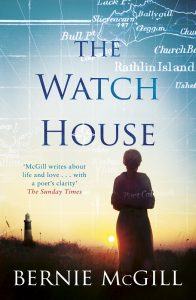Bernie McGill On Writing
 I’ve embarked on a new writing project recently. It may be a novel. I’m hoping it will be a novel, but at the moment, it’s a few thousand words of stray comments, observations, reflections and responses to a fictional situation by a fictional character in a real place that I know fairly well and am getting to know better by the day.
I’ve embarked on a new writing project recently. It may be a novel. I’m hoping it will be a novel, but at the moment, it’s a few thousand words of stray comments, observations, reflections and responses to a fictional situation by a fictional character in a real place that I know fairly well and am getting to know better by the day.
I’ve visited this spot, stayed there on a number of occasions, and now I’m reading about it, the history of it, its geography, its industries, its agriculture, its folk traditions, its people. It’s how I like to work, to immerse myself in the setting of the story as much as I can, and then introduce something, or someone, new to it.
I have a box of books from the local library and another box lent to me by a friend and I’m slowly working my way through them, renewing the library books to their limit, wondering how long I can reasonably hold on to my friend’s borrowed books, and asking myself, as I always do, if I should, in fact, buy the books, so I can feel free to write all over the pages.
At this stage, the task feels fairly daunting. I’m a very slow writer. I don’t really operate along the lines of x thousand words per day, although when I see the word count begin to climb, I am, of course, thrilled with that. I go forward in small increments, in post-its and scraps of paper, in notes on my phone and in marginal scribbles whenever I can.
I’m slow to reach for the laptop. It feels like serious business. When I do, I often print off what I’ve written. There’s something very appealing to me, something slightly transgressive and playful about hand writing in biro over and beside the printed text, something interesting in the way that the story begins to weave itself in and through and around what’s already there. And for every few dozen words written there are as many words of questions. Who is the person speaking? What has she to do with this place? What has happened? What is it that she’s done? In other words: What’s the story?
I do quite a lot of work with beginning and emerging writers, in workshops, in a mentoring situation, and I know that the question writers really want to know the answer to is: ‘How do you write a story?’ or ‘How do you write a novel?’ I don’t know how to answer that, except to say what Neil Gaiman says* which is, ‘Put one word after another.’ It seems disingenuous, maybe, to put it that way but essentially that’s what’s required. It would be remiss of me not to add what Neil Gaiman adds later down the page, which is: ‘Fix it.’ As all of us know who write, there’s the crux of it. Write it, then rewrite it, then rewrite it again. But before you get to the rewriting, you have to do the writing in the first place and there are days when even picking up the dried-up dog dirt out of the garden grass seems a more attractive option.
One of my favourite books about writing is Writing Down the Bones by Natalie Goldberg. Reading it is almost a kind of meditation in itself. I have to remind myself to pick it up now and again and return to some of the many underlined extracts that help me back to writing. Here is one: ‘if you want to write, you have to just shut up, pick up a pen, and do it. I’m sorry there are no true excuses. This is our life. Step forward.’ Step forward, indeed. Stop your mithering. What are you afraid of? What’s the worst that can happen?
A few years ago, I attended a workshop led by the Irish writer Christine Dwyer-Hickey. I was working on an early version of The Watch House** at the time, and had lost my way a little. I remember saying to her: ‘I’m really struggling with this,’ to which she replied, ‘Don’t struggle. Just write it.’ I think that’s really good advice and advice I’ve recalled again recently.
I’m guilty, I know, of finding fault with what I’ve written even before I’ve written it, of finding more fault with it on the page, of finding multiple excuses not to write, of attempting to clear my desk of the many other tasks that are pending so that I can have a clear head to write, of emptying the dishwasher, of walking the dog, of finding that I urgently need to hoover the cobwebs from the corner of the kitchen. As Natalie Goldberg puts it: ‘We have tremendously strong monkey minds that are very creative and always thinking of new reasons why we can’t write.’
A few days ago, I came across a piece of advice from a writer friend that I’d written in one of my notebooks. It’s not an excuse for being lazy, for not committing to the work, it’s not a reason to absolve anyone: there’s no substitute for putting words on the page. But it is a kind of acknowledgement, an exoneration of sorts, and to my ear, it sounds almost like a blessing.
There are times when we need to be kind to ourselves and these words remind me of that. Her name is Maria McManus and she is a poet and a wise person. This is some of what she said: ‘Don’t despair if you are feeling slow or that you aren’t getting anywhere fast. It often is slow, very slow. Just remember that reading is also the work. Thinking about it is also the work. Your journal is also the work. Walking is also the work. Showing up, is the work.’ There’s no mention of picking up the dog dirt – that might be a bit of a stretch – but I think this is sound advice. Keep the writing in your head, meet the world with an open heart, stay alive to the extraordinary in the everyday, and then sit down and go to work.
*Neil Gaiman is joined by thirteen other writers in these Rules for Writing Fiction in The Guardian https://www.theguardian.com/books/2010/feb/20/ten-rules-for-writing-fiction-part-one
**Link to the paperback edition of The Watch House on Amazon
https://www.amazon.co.uk/Watch-House-Bernie-McGill-ebook/dp/B01KTS4ZLC/ref=asap_bc?ie=UTF8
Further links:
Natalie Goldberg
http://nataliegoldberg.com/books/writing-down-the-bones/
Christine Dwyer-Hickey
http://christinedwyerhickey.com
Maria McManus
https://mariamcmanus.wordpress.com
 Bernie McGill is the author of Sleepwalkers, a collection of stories short-listed in 2014 for the Edge Hill short story prize, and of The Butterfly Cabinet (named in 2012 by Downton Abbey creator Julian Fellowes as his novel of the year). Her latest novel, The Watch House, is set on Rathlin Island in 1898 at the time of the Marconi wireless experiments. She has been published in the UK, the US and in translation in Italy and the Netherlands. Her work has been placed in the Seán Ó Faoláin, the Bridport, and the Michael McLaverty short story prizes and she won the Zoetrope: All-Story award in the US in 2008. Her short fiction has appeared in acclaimed anthologies The Long Gaze Back, The Glass Shore and Female Lines, all by New Island Books, and for the theatre she has written The Haunting of Helena Blunden and The Weather Watchers. She works as a Creative Writing facilitator, as a Writer in Schools with Poetry Ireland, and as a Professional Mentor with the Irish Writers’ Centre. In September 2018 she takes up a Writing Fellowship with the Royal Literary Fund at the Seamus Heaney Centre, Queen’s University, Belfast.
Bernie McGill is the author of Sleepwalkers, a collection of stories short-listed in 2014 for the Edge Hill short story prize, and of The Butterfly Cabinet (named in 2012 by Downton Abbey creator Julian Fellowes as his novel of the year). Her latest novel, The Watch House, is set on Rathlin Island in 1898 at the time of the Marconi wireless experiments. She has been published in the UK, the US and in translation in Italy and the Netherlands. Her work has been placed in the Seán Ó Faoláin, the Bridport, and the Michael McLaverty short story prizes and she won the Zoetrope: All-Story award in the US in 2008. Her short fiction has appeared in acclaimed anthologies The Long Gaze Back, The Glass Shore and Female Lines, all by New Island Books, and for the theatre she has written The Haunting of Helena Blunden and The Weather Watchers. She works as a Creative Writing facilitator, as a Writer in Schools with Poetry Ireland, and as a Professional Mentor with the Irish Writers’ Centre. In September 2018 she takes up a Writing Fellowship with the Royal Literary Fund at the Seamus Heaney Centre, Queen’s University, Belfast.
https://www.facebook.com/BernieMcGillWriter/
https://twitter.com/berniemcgill
Category: On Writing


























I loved the last paragraph, and your approach and your doubts and missteps resonate. But that last paragraph really clinches it, and Gaiman’s advice, too. He knows.
Though I bridled at the one writer’s advice, “Don’t struggle, Just write it” — I always feel that’s advice from someone who never has. Also, the tough love “stop mithering” — no. People get stuck (sometimes badly stuck) for many reasons, and there are things that steal writing away for a while…sometimes it’s hard to find your way back. It’s a struggle — I think the point is that if we’re struggling, we’re still trying. And if we keep trying, we’ll get there.
‘There are things that steal writing away for a while.’ This is so true, Mauri. I think Christine Dwyer Hickey’s advice was what I needed to hear at the time. Sometimes it is as simple as, ‘Just write it,’ but so often we seem to need permission to do this. Natalie Goldberg writes about how she had a class with which she had worked for some time and she said to them: ‘You know what to do, pick up a pen and write.’ She writes about how their faces lit up. She said, ‘Wait a minute. You travelled all the way from Chicago, from Boston, Kentucky, L.A., you’ve taken three other seminars with me. You already know this.’ And they said, ‘Yeah, but we needed to hear it again.’ This is how I feel when I go to workshops led by other writers – something I love to do. I just need to hear it spoken aloud from someone else: ‘Just write it.’
Thanks for this Bernie, it should be required reading for me everyday especially those days when I’ve read something out and then feel so inhibited. Also those days when I feel my last writing was really my last. Not because there is nothing more to say, or there isn’t enough time left to write it but the feeling of questioning the validity of my thoughts.
Thanks for the encouragement.
Best wishes and I’m watching your space!
Liz
Thank you for taking the time to comment, Liz. I think we all feel guilty about saying that there are times when we find it hard to write. Natalie Goldberg’s book is amazing. It never fails to uplift me. I’d also recommend Ben Okri’s essays, A Way of Being Free. He’s so encouraging about the importance of the role of the storyteller. I go back to him regularly as well.
Wishing you good writing.
Bx